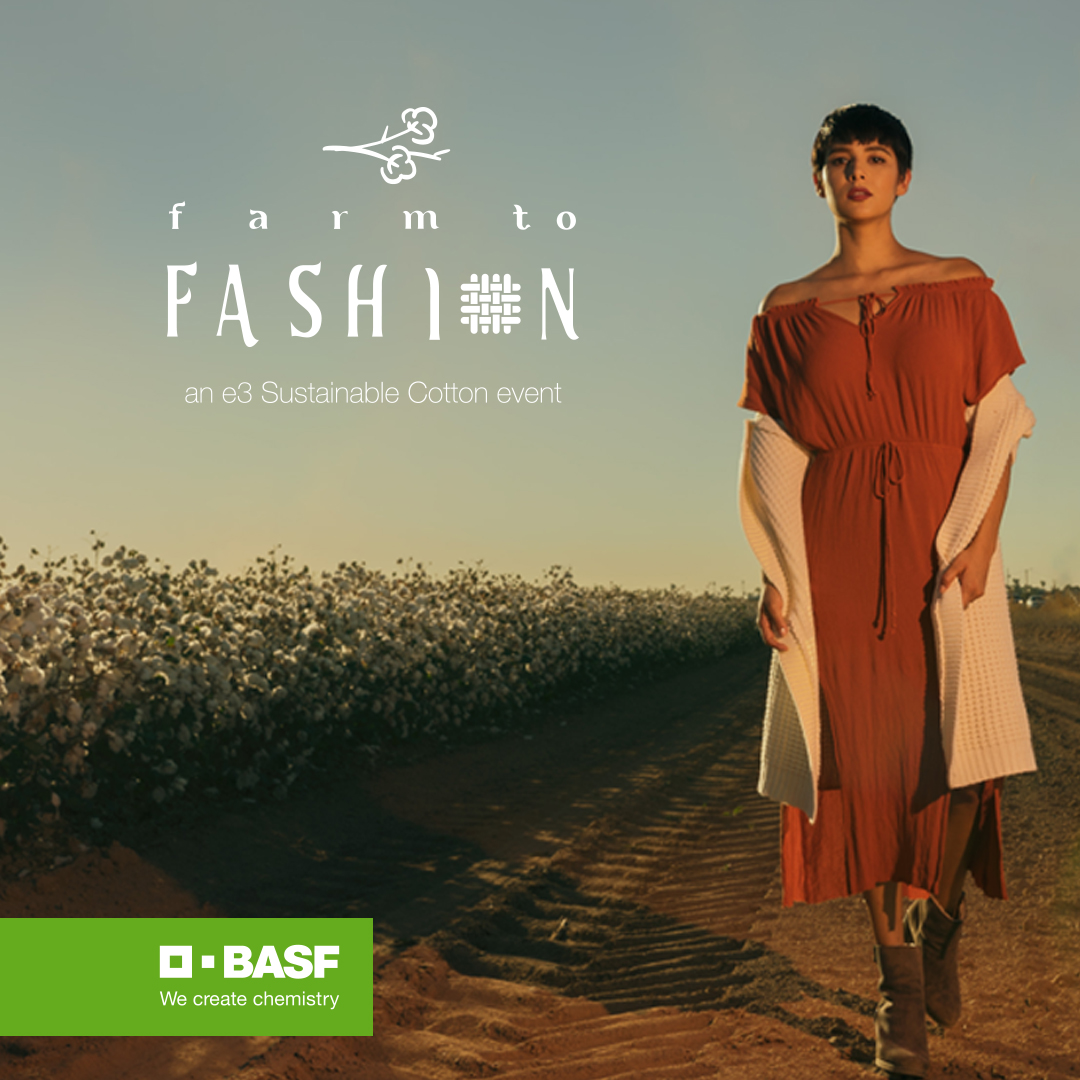The e3 Sustainable Cotton program provides a platform for farmers and supply chain partners to discuss transparency and traceability in the cotton industry

National fashion and textile editors recently took a break from their busy deadlines and embarked on a virtual trip called Farm to Fashion: an e3 Sustainable Cotton event. Led by BASF Fiber Development Manager Jennifer Crumpler, editors traveled on a sustainable cotton journey, beginning in the field and ending with jeans.
“The purpose of the e3 Farm to Fashion event is to bring together voices from all parts of the cotton supply chain,” said Crumpler. “We’re proud that our partners provide cotton and end products that are sustainable and made in the U.S.”
Traveling with cotton: from seed to jean
Those partners included Louisiana cotton farmers Marshall and Mead Hardwick, who together with their parents, run Hardwick Planting Company. The family farms approximately 9,000 acres of cotton, corn, soybeans, wheat, and sorghum.
After hearing from the Hardwick’s about their operation in Newellton, LA, guests “traveled” a short distance to Vidalia, LA, where Eric Goldstein, executive vice president at Vidalia Mills, shared the story behind the mill. Because of their commitment to a completely tracebable supply chain, the mill exclusively uses e3 sustainable cotton.
Guests then took a virtual trip to Los Angeles, CA, and listened to the compelling story of Trinidad Garcia III, founder of Trinidad3 Jeans and United States Marine Corps. veteran. His swap from machine guns to sewing machines and passion for community and underserved veterans is interesting enough on its own, but Garcia is also committed to only sourcing cotton and materials from the U.S.
Educating consumers on sustainability red flags
After hearing from the speakers, the media was then invited to participate in a live Q&A session and discussed topics like supply chain issues (there are none when all your labor and materials are sourced from within the U.S.), product labels, and sustainability.
Betsy Cribb, editor at Southern Living magazine, asked if there were any red flags that consumers should watch out for when purchasing cotton items, like with the word “organic” used in the food industry.
Goldstein answered, “Yes, there are a lot of words, and that issue runs deep, but the word ‘organic’ is misused in the fashion industry nearly as much as it is in food.” Goldstein and Garcia both agreed that there are no government label restrictions, meaning brands can put the word organic or “used less water” on their materials without having to validate those claims.
“That is essentially why we are here,” said Crumpler. “No one is delivering the traceability data and transparency like the e3 Sustainable Cotton program and our partners right here.”
And Vidalia Mills is taking that traceability one step further with the goal of having the entire supply chain – from cotton fiber to finished goods – under one roof.
“The e3 cotton program is very important to us,” said Goldstein. “Our customers want traceable, sustainable cotton and we get that from our e3 cotton. We’re proud that we can show consumers things like when their cotton was harvested and how much water was used growing it. Other brands are claiming this, but only e3 has the data to back up their claims.”
Delivering on a promise
“Brands like ours have to lead by example because consumers are putting their trust in us,” said Garcia. “They deserve a well-made product and to be told the true story behind how it’s [jeans] made.”
And that story starts on the farm.
“As fourth-generation cotton farmers, our job is to leave the land better than we found it,” said Marshall Hardwick. “How we grow our e3 cotton is of the utmost importance and knowing that cotton travels from our gin to Vidalia Mills and then on to brands like Trinidad3 makes us proud to be part of a program that delivers the data and transparency consumers deserve.”
For more information on the e3 Sustainable Cotton program by BASF, visit e3cotton.us.
BASF would like to thank our media guests for the thoughtful, informative commentary: Betsy Cribb, Southern Living; Melissa Ozawa, Martha Stewart Living; Matt Migliore, International Fiber Journal; Kaley Roshitsh, WWD and Andrea Bossi, The Zoe Report.
